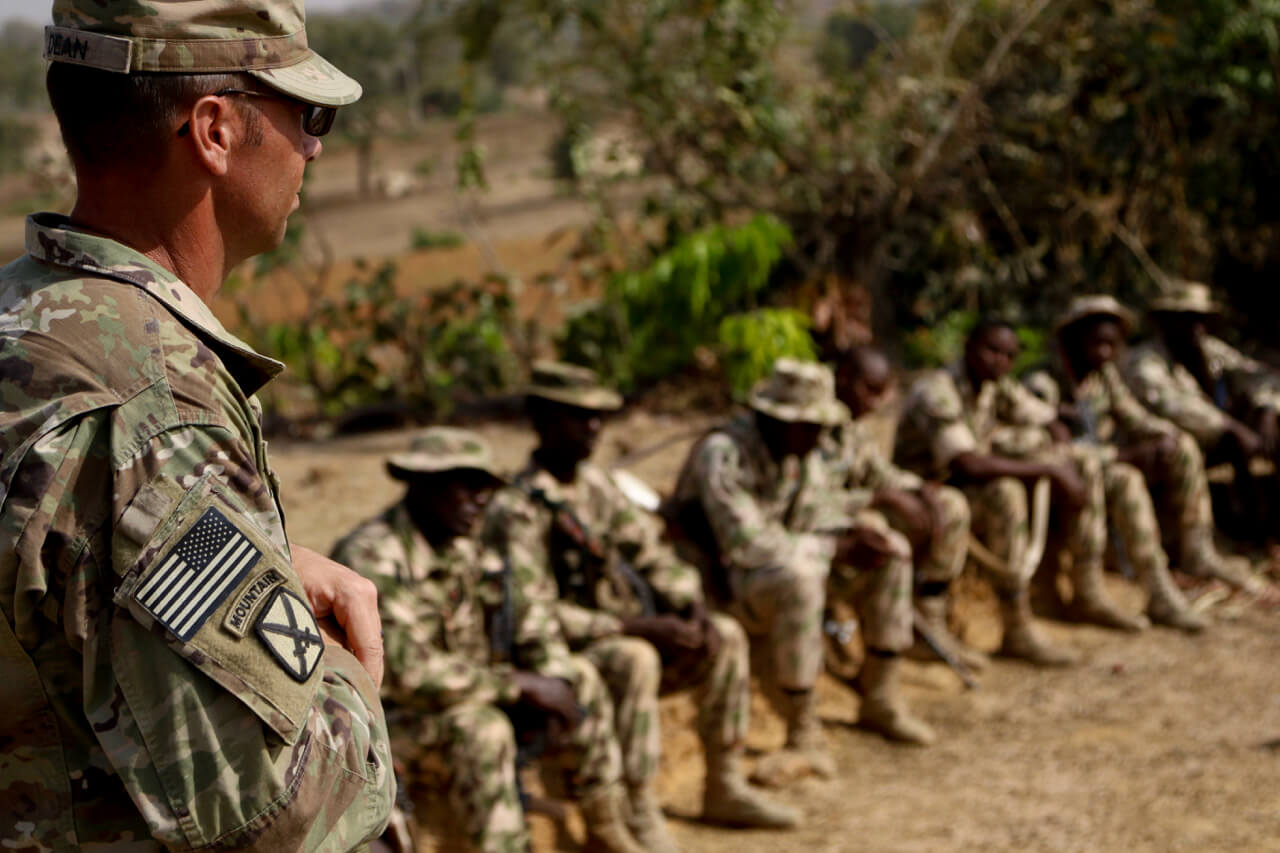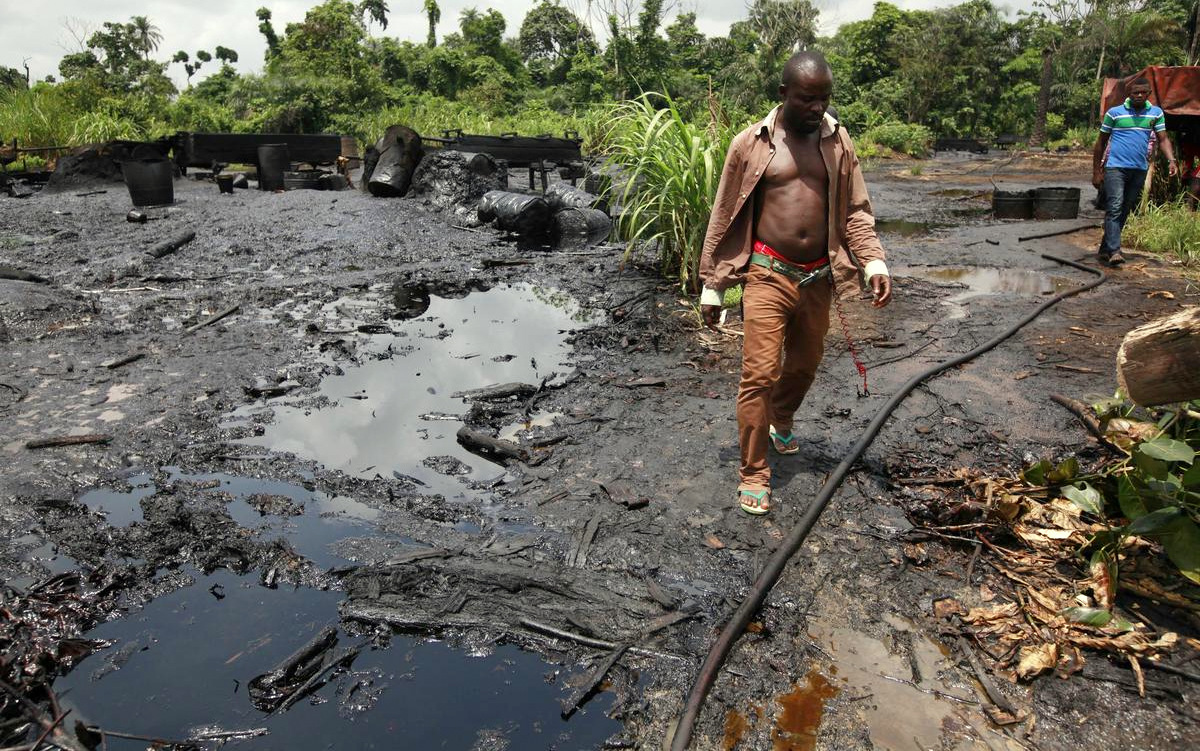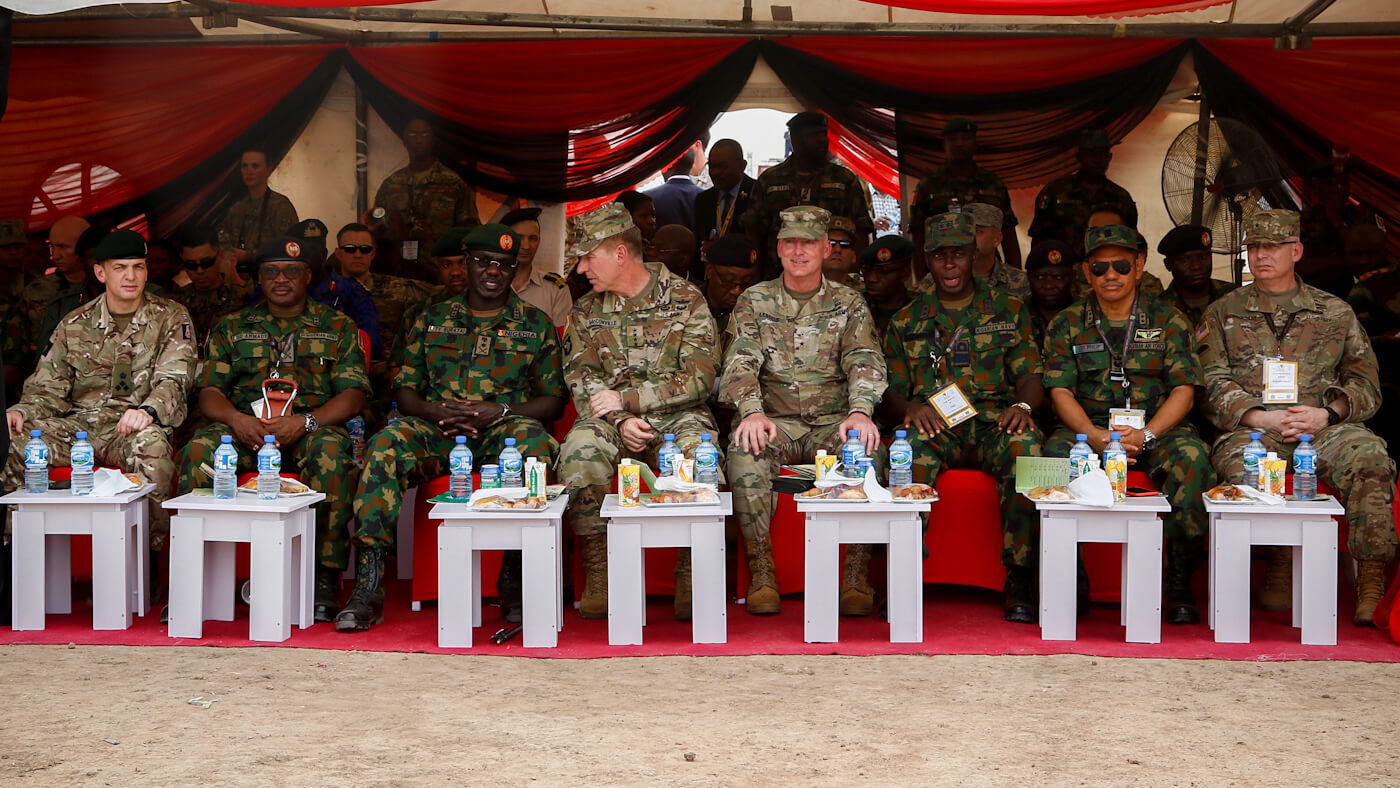Amid the George HW Bush imperial death-orgy, the endless saga of Midtown Mussolini’s daily news cycle, the seemingly unprecedented political upsurge in France, and countless other show-stopping news stories, you likely missed three very sad, yet revealing, incidents out of the Sahel region of West-Central Africa.
First, on November 18th, a massive offensive against a Nigerian military base by a faction of the Boko Haram terror group known as the Islamic State West Africa (ISWAP) killed upwards of 100 soldiers. The surprise attack came at a time when Nigerian President Muhammadu Buhari, who famously (and repeatedly) has declared victory against Boko Haram and terrorism, has faced a crisis of legitimacy, falling approval ratings, and an impending election in early 2019.
Just days later, on November 22nd, while most Americans were gathering with family and eating turkey on Thanksgiving, a contingent of about 50 armed militants kidnapped at least 15 girls in Niger, just outside a town in the Diffa region, near the border with Nigeria. While Boko Haram did not officially claim responsibility, many have attributed the action to the terror group, or one of its factions, given their propensity to use kidnappings for propaganda and fundraising.
And on the very same day, also in Diffa near the Niger-Nigeria border, suspected Boko Haram militants killed seven employees of Foraco, a French well drilling and mining company.
This spate of deadly, and rather brazen, attacks on civilians along the Niger-Nigeria border paints a troubling picture of the continued instability of the region, and give the lie to the idea that counter-terrorism operations, ongoing for a number of years now, have put Boko Haram and other terror groups on the back foot.
This reality is undoubtedly a political liability for Nigerian President Buhari who was elected on the promise of stamping out terrorism and bringing stability and the rule of law to Nigeria. Of course, a number of uncomfortable questions can and should be asked of Buhari, his top military commanders, and other bureaucrats in his administration.
But perhaps the more salient questions should be posed, not to Nigeria’s government, but to the US Government itself, and specifically its African Command (AFRICOM). For it is Washington, not Abuja, that has poured billions of dollars into counter-terrorism and surveillance in the Sahel and West Africa. Considering the laundry list of attacks and killings, one could naturally ask the question: What exactly is the US doing over there, if not counter-terrorism?
Nigeria, Niger, and AFRICOM
These most recent incidents paint a worrying portrait of the on-the-ground reality in the region where terror groups not only continue to exist but seemingly are thriving. Lucrative trade in illicit goods, drugs, human trafficking, and more has continued to line the pockets of these militant organizations. But the very fact that these killings are continuing calls into question the efficacy of, and agenda behind, the US AFRICOM force.
As the Washington Post reported back in 2013, the US has chosen Agadez, Niger as the site of a massive new drone facility that will act as a “strategic foothold” in West Africa, specifically with regard to the stated mission of surveillance of terrorist networks. And the US has been flying drones from the facility for more than five years.
However, as The Intercept’s Nick Turse has reported, what was originally intended to be a relatively small facility hosting a few US drones and military advisers has ballooned into a more than $100 million investment that will be one of the US’s most costly foreign military construction projects. And instead of simply housing a handful of Predator drones, the facility will be the base for MQ-9 Reaper drones before the end of next year. Naturally, it’s unclear just how many drones are already flying out of the facility, though knowledgeable observers assume a significant number already are.
This base, which will act as a hub of the broader AFRICOM drone surveillance network sprawling over much of the African continent, is just a short flight from where these latest horrific incidents have taken place. And yet, it seems the US either was unable or unwilling to do anything to stop them. Even with the most advanced surveillance and communications equipment, somehow groups of dozens or hundreds of fighters are moving into towns conducting mass kidnappings, pillage, and worse all under the nose of Washington.
And beyond the Agadez base, the US has a military presence in both Niger and Nigeria, with both countries routinely hosting US soldiers and military advisers, often with the specific intent of assisting local forces in the fight against Boko Haram and other terrorist groups. An ambush attack against 4 US soldiers in Niger has recently brought the issue into the headlines as Washington considers reducing the number of ground operations its soldiers directly participate in.

It should also be noted that the US operates a number of other clandestine surveillance hubs throughout the continent, at least one of which is in relatively close proximity to the area where the attacks took place. As the Washington Post’s Craig Whitlock reported in 2012:
“A key hub of the U.S. spying network can be found in Ouagadougou, the…capital of Burkina Faso… Under a classified surveillance program code-named Creek Sand, dozens of U.S. personnel and contractors have come to Ouagadougou in recent years to establish a small air base on the military side of the international airport. The unarmed U.S. spy planes fly hundreds of miles north to Mali, Mauritania and the Sahara.”
Moreover, AFRICOM leads annual, large-scale military exercises throughout the region, as well as focusing on broad strategic initiatives that embed US military forces into the military command structures of these countries.
A Little History
It should be noted that the US has been involved in the Sahel region going back to the early years of the George W. Bush administration, even before the establishment of AFRICOM, which was later greatly expanded by the Obama administration.
After 9/11, the United States began to grow its military footprint on the African continent under the guise of a ‘War on Terror’, selling this notion to a United States gripped with fear of terrorism. With programs such as the Pan-Sahel Initiative, later broadened into the Trans-Saharan Counterterrorism Initiative, Washington managed to provide military and financial assistance to compliant countries in North Africa – a policy whose practical application meant that the US military became the dominant force in the Sahel region, supplying the human and material resources for which the governments of the region were starved. Naturally, this meant an implicit subservience to US military command.
And with the establishment of AFRICOM, these relationships were further cemented such that today we see annual, massive military exercises such as Exercise Flintlock which brings together numerous African countries under the auspices of US military leadership. While this year marked the first time that the more than 20 nations’ militaries were led by African forces, it remains US military at the head of the table.
Any guesses where Flintlock 2018 took place? That’s right, Niger.
It’s the Resources, Stupid
President Obama was not the architect of AFRICOM, which was established in 2007 under Bush, but he was perhaps its greatest champion, greatly expanding its scope and funding.
Obama grandly proclaimed in 2014:
Today’s principal threat no longer comes from a centralized Al Qaeda leadership. Instead, it comes from decentralized Al Qaeda affiliates and extremists, many with agendas focused in the countries where they operate…We need a strategy that matches this diffuse threat; one that expands our reach without sending forces that stretch our military thin, or stir up local resentments.”
As with all things Obama, the truth and disinformation so seamlessly blend together that it can be difficult to parse one from the other. While no doubt there is truth in what he stated, the underlying subtext is much more interesting to consider. For while Obama and his cohorts would endlessly wax poetic about security and stability, the true mission of AFRICOM is neocolonial in nature.
Yes, it must be said that in fact AFRICOM is an occupying force that in no way functions to guarantee the security of African people (see Libya, among others), but rather to guarantee the free flow of resources out of Africa and into the Global North, particularly former colonial powers like France and Britain, and of course the US.
In case there’s any doubt, consider the following statements from Vice-Admiral Robert Moeller, military deputy to former commander of AFRICOM General William ‘Kip’ Ward, who told an AFRICOM conference in 2008 that AFRICOM’s goal was “protecting the free flow of natural resources from Africa to the global market.” Furthermore, Moeller wrote in 2010, “Let there be no mistake. AFRICOM’s job is to protect American lives and promote American interests.”

So, if we strip away the flowery rhetoric about stability and security, both, of course, vital to resource extraction and export, it becomes clear that it is, in fact, natural resources that drive the US strategic interest in Africa, along with countering the growing Chinese footprint on the continent.
The last decade has seen major oil discoveries throughout the Lake Chad Basin which have transformed how the states of West Africa view their economic future. At the heart of the basin is Lake Chad, surrounded by the countries of Nigeria, Chad, Cameroon and Niger. According to a 2010 assessment from the U.S. Geological Survey (USGS), the Chad Basin has “estimated mean volumes of 2.32 billion barrels of oil, 14.65 trillion cubic feet of natural gas and 391 million barrels of natural gas liquids.” The potential size of these resources has attracted the attention of political and business leaders, both in the region and internationally.
Those oil reserves have gained the attention of each of the Lake Chad littoral states, and led to something of a scramble among them to siphon off as much oil from their neighbors as possible. Of course, it’s not only oil and gas that are of interest, especially since the US has become a net exporter of oil.
But for France, the former colonial power in the region, which still maintains a large military presence in the Sahel under the auspices of Operation Barkhane, oil remains an essential priority in Africa.
As a top oil executive in Chad told Nigerian daily This Day that, “Currently, oil from Lake Chad being drilled by the Republic of Chad is…shipped through tankers to the international refineries at the Port of Le Havre in France.”
And in Niger, a country rich in mineral deposits such as uranium which are vital to France’s vast nuclear energy sector, France remains the dominant economic player. As Think Africa Press reported in 2014:
“France currently sources over 75 percent of its electricity from nuclear energy and is dependent on Niger for much of its immediate and future uranium supply. This dependence could grow even further when production at the recently-discovered Imouraren uranium deposit is up and running in 2015. The mine is set to produce 5,000 tonnes of uranium per year and would help make Niger the second-largest uranium producer in the world. Areva, which is 87 percent owned by the French state and holds a majority share in three out of the four uranium mining companies operating in Niger, is funding the new mine.”
And oh, by the way, Niger’s president Mahamadou Issoufou is a former employee of Areva, the French company that dominates the uranium trade in Africa.
Perhaps then we should return our thinking to the recent attack that killed seven employees of the French drilling company Foraco. Was this part of the broader efforts by French capitalists to continue extracting uranium and/or other minerals for shipment back to the “mother country”? One has to wonder, considering Foraco does not confine itself solely to drilling wells for water.
Is the US surveillance architecture so brittle and inept that it simply missed the movement of hundreds of members of the very organizations Washington is allegedly fighting in the region? Is it simply that the US is unable to effectively spy on this area until its massive Agadez base is complete? Is it that these terror groups have grown in sophistication such that they are able to elude the most advanced military and spying capabilities in the world?
The answers to these questions might take some time to fully emerge. But what we do know is that US military in Africa is effectively an occupation and resource extraction force that uses local militaries as proxies for its own agenda. The terror groups operating in the region have made untold millions and committed countless atrocities right under the noses of the purportedly benevolent American military forces.
So, if counter-terrorism is really what the US is interested in in the Sahel and West Africa, then the AFRICOM mission is an abject failure. Of course, seen as a neocolonial occupying force utilizing both hard and soft power to entrench US hegemony and guarantee the free flow of resources from Africa, it is a rousing success.
Top photo | United States and Nigerian Army officers wait for the military demonstration, «Operation Silent Kill” to begin at the African Land Force Summit in Abuja, Nigeria, April 17, 2018. Angelica Gardner | DVIDS
Eric Draitser is a political analyst and host of CounterPunch Radio. You can follow and support his work at CounterPunch and patreon.com/ericdraitser.
Source | CounterPunch


